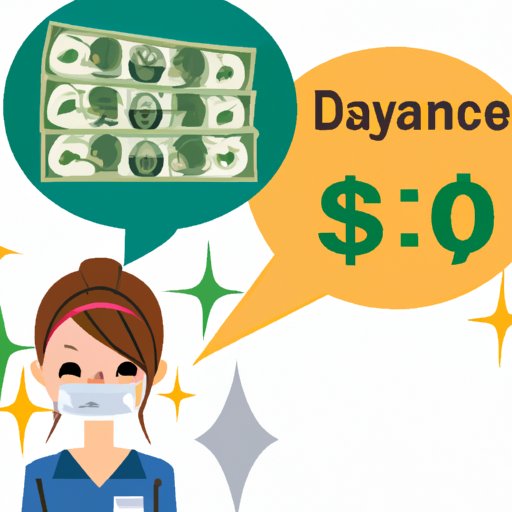Introduction
A dental hygienist is a professional who specializes in oral healthcare. They are responsible for providing preventive dental care to patients, such as cleaning teeth, taking X-rays, and giving advice on proper oral hygiene. With more people visiting the dentist regularly, the need for qualified hygienists has increased significantly.
So, if you’re considering becoming a dental hygienist, you’re probably wondering how much money you can make. In this article, we’ll take an in-depth look at the salaries of hygienists and explore what factors can influence their earnings.

A Comprehensive Guide to Hygienist Salaries
Dental hygienists usually earn a median annual salary of $73,440, according to the Bureau of Labor Statistics (BLS). However, the actual amount can vary widely depending on various factors, such as location, experience, type of job, and more.
What You Need to Know About the Salary of a Professional Hygienist
The salary of a dental hygienist depends on several factors, including the type of practice they work in, the number of hours they work, where they live, and their level of experience. Generally speaking, hygienists working in larger cities tend to earn more than those working in smaller towns or rural areas.
In addition, the type of job a hygienist holds can also affect their salary. For example, hygienists employed by private practices generally earn more than those working in public health clinics or hospitals. Hygienists who specialize in certain areas, such as orthodontics, may also earn more than general hygienists.
How Much Can You Earn as a Dental Hygienist?
The BLS reports that the median annual salary for a dental hygienist is $73,440. However, the actual amount can vary widely depending on factors such as location, experience, type of job, and more. According to PayScale, the average hourly rate for a dental hygienist is $30.11.
In addition, the BLS notes that the highest 10 percent of earners made more than $98,890 in 2019. On the other hand, the lowest 10 percent of earners made less than $49,120 in the same year.

Breaking Down the Average Pay for a Dental Hygienist
To get a better understanding of how much hygienists can earn, we’ve broken down the average pay for different types of hygienists. According to the BLS, the median annual salary for a dental hygienist in a private practice is $74,820, while the median annual salary for a public health clinic hygienist is $64,650.
For orthodontic hygienists, the median annual salary is $76,190. Specialty hygienists, such as periodontists, can expect to earn a median annual salary of $82,580.
Factors Affecting Hygienist Salaries
As mentioned earlier, there are a few key factors that can affect the salary of a dental hygienist. These include:
- Location: Hygienists in large cities typically earn more than those in smaller towns or rural areas.
- Experience: The more experience a hygienist has, the higher their salary is likely to be.
- Type of Job: Hygienists employed by private practices generally earn more than those in public health clinics or hospitals.
- Specialization: Hygienists who specialize in certain areas, such as orthodontics, may also earn more than general hygienists.

Examining the Wages of Different Types of Hygienists
While the median annual salary for a dental hygienist is $73,440, the actual amount can vary widely depending on the type of hygienist. According to the BLS, the median annual salary for a dental hygienist in a private practice is $74,820. For orthodontic hygienists, the median annual salary is $76,190, while specialty hygienists, such as periodontists, can expect to earn a median annual salary of $82,580.
Additionally, the BLS reports that the highest 10 percent of earners made more than $98,890 in 2019. On the other hand, the lowest 10 percent of earners made less than $49,120 in the same year.
Conclusion
Dental hygienists play an important role in providing preventive dental care to patients. The median annual salary for a dental hygienist is $73,440, according to the Bureau of Labor Statistics. However, the actual amount can vary widely depending on factors such as location, experience, type of job, and specialization.
Hygienists in large cities usually earn more than those in smaller towns or rural areas. Additionally, the type of job a hygienist holds can also affect their salary. Hygienists employed by private practices generally earn more than those working in public health clinics or hospitals. Hygienists who specialize in certain areas, such as orthodontics, may also earn more than general hygienists.
Ultimately, the salary of a dental hygienist depends on several factors, so it’s important to research thoroughly before deciding whether this career is right for you.
(Note: Is this article not meeting your expectations? Do you have knowledge or insights to share? Unlock new opportunities and expand your reach by joining our authors team. Click Registration to join us and share your expertise with our readers.)
